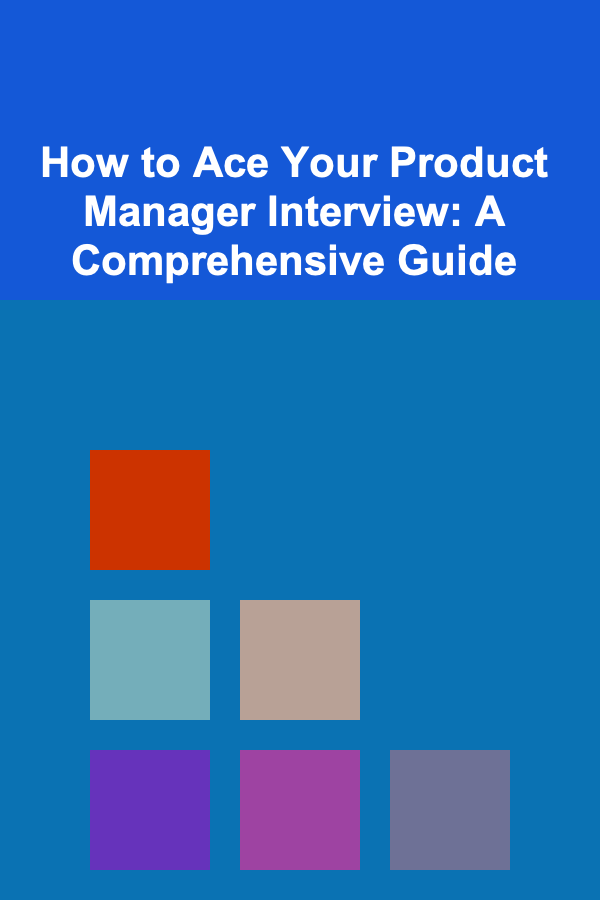
How to Ace Your Product Manager Interview: A Comprehensive Guide
ebook include PDF & Audio bundle (Micro Guide)
$12.99$7.99
Limited Time Offer! Order within the next:

A product manager (PM) is responsible for guiding the development and success of a product throughout its lifecycle. As a crucial member of any product-driven organization, a product manager's role is both dynamic and multi-faceted. Product managers must possess a unique blend of strategic thinking, technical acumen, and communication skills. Consequently, acing a product manager interview requires preparation across a wide range of topics, from understanding the product management lifecycle to showcasing your ability to lead cross-functional teams.
In this guide, we will take a deep dive into how to excel at your product manager interview, covering essential aspects like the interview structure, core skills, key questions to prepare for, and tips for handling various interview stages.
Understanding the Product Manager Role
Before diving into interview preparation, it is important to fully understand the role of a product manager. A product manager is responsible for the strategy, roadmap, and feature definition of a product or product line. They act as a bridge between the business, technical, and design teams to ensure that the final product meets customer needs, business objectives, and market demands.
Key responsibilities include:
- Product Strategy: Defining and refining the product vision and strategy to meet customer needs and business goals.
- Roadmap Development: Creating and maintaining the product roadmap to guide the product's evolution.
- Cross-functional Leadership: Collaborating with engineering, marketing, sales, design, and other teams.
- Customer Focus: Understanding customer pain points and ensuring the product delivers value to the target audience.
- Data-driven Decisions: Leveraging analytics to measure success, iterate on features, and optimize product performance.
By understanding the core responsibilities and the intersection of business, technology, and design, you will better prepare yourself for what to expect during the interview process.
Preparing for the Product Manager Interview
Product manager interviews are known for their rigor and breadth. They typically consist of several stages, and the questions posed during the interview are meant to assess your strategic thinking, problem-solving skills, and ability to manage complex projects. The interview may include behavioral, technical, and case study questions, all of which require a thoughtful approach.
Key Areas to Prepare for:
- Product Sense: Ability to understand customer needs, define a product vision, and prioritize features.
- Technical Knowledge: Depending on the company and product type, you may need to demonstrate understanding of the technical aspects of product development.
- Behavioral Skills: How you work with teams, resolve conflicts, make decisions, and prioritize tasks.
- Data Analysis: Demonstrating your ability to use data to drive product decisions and measure outcomes.
Research the Company
Before your interview, research the company thoroughly. Understand its products, market, competitors, and any recent news or developments. Review the company's product portfolio, its history, and the technologies it uses. This knowledge will allow you to tailor your responses and demonstrate that you are genuinely interested in working with that particular organization.
Interview Structure and Stages
Product manager interviews generally follow a multi-stage process that includes both technical and behavioral elements. The specific stages may vary depending on the company, but they typically consist of the following:
Stage 1: Initial Screening/Phone Interview
This is typically a 30- to 60-minute interview conducted by a recruiter or a hiring manager. The focus is often on your background, understanding of the role, and whether you fit the company's needs.
-
What to Expect:
- Questions about your resume and previous experiences.
- General questions about your interest in the company and the role.
- High-level questions about how you approach product management and solving business problems.
-
Tips: Be clear about your experiences, especially the most relevant ones for the role. Prepare to talk about your understanding of the company's products and demonstrate your enthusiasm for joining their team.
Stage 2: Behavioral Interviews
These interviews assess how you handle various situations and work within teams. Behavioral interviews typically focus on your past experiences, leadership style, problem-solving abilities, and how you've handled challenges.
-
Common Behavioral Questions:
- Tell me about a time you led a product team to success.
- How do you prioritize competing demands from stakeholders?
- Describe a situation where you had to pivot a product based on user feedback.
- How do you resolve conflicts within a team?
-
Tips: Use the STAR method (Situation, Task, Action, Result) to structure your responses. Focus on the impact of your actions and how they benefited the product or company.
Stage 3: Technical/Product Sense Interview
In this stage, you'll be asked to solve a case study or design a product. The interviewer will test your ability to think strategically and make data-driven decisions. You may also be asked questions related to product metrics or how to address customer pain points.
-
Common Product Sense Questions:
- How would you design a product to solve X problem?
- Imagine you are the PM of a new feature; how would you prioritize the features to include?
- Walk me through how you would validate a new product idea.
-
Tips: Think through the problem systematically. Break down the issue, identify customer pain points, discuss possible solutions, and prioritize your actions. Always back up your ideas with reasoning, showing that you understand the full product lifecycle.
Stage 4: Leadership and Collaboration Interview
This interview evaluates how you collaborate with cross-functional teams. It's crucial to show that you can influence stakeholders, resolve conflicts, and communicate effectively with different departments.
-
What to Expect:
- How do you work with engineers to ensure a product is delivered on time?
- How do you handle disagreement or pushback from stakeholders?
- Describe a time when you had to lead a team under a tight deadline.
-
Tips: Emphasize your teamwork, communication, and leadership abilities. Show how you adapt to different team dynamics and encourage collaboration.
Stage 5: On-Site or Final Round Interview
In the final round, you may be required to solve more complex case studies or participate in role-play exercises. Some companies also ask for a product presentation, where you present a product idea, your reasoning for the design, and how it aligns with business goals.
- Tips: Make sure to practice presenting your ideas clearly and confidently. Be ready for detailed discussions and follow-up questions. Don't be afraid to ask clarifying questions if something is unclear.
Common Product Manager Interview Questions
Here are some examples of questions you should be prepared to answer:
General Background Questions:
- Tell me about yourself and your experience as a product manager.
- Why do you want to work for our company?
- What is your process for developing a product roadmap?
- How do you define success for a product?
Product Sense and Strategy Questions:
- How would you improve a product like [insert product]?
- Walk me through your approach to launching a new feature.
- If you were the PM for [company's product], what changes or improvements would you make?
Technical Questions:
- How would you explain a technical concept (e.g., APIs, data pipelines) to a non-technical stakeholder?
- What's your approach to working with engineers on a new feature?
- How would you assess the scalability of a product?
Metrics and Data-Driven Questions:
- What product metrics do you focus on and why?
- How do you measure the success of a product feature?
- How would you use data to prioritize features in a product roadmap?
Leadership and Teamwork Questions:
- How do you motivate your team during difficult situations?
- Describe a situation where you had to make a tough decision and how you communicated it to your team.
- How do you ensure alignment among cross-functional teams?
Key Skills to Highlight in Your Interview
To succeed in a product manager interview, it's essential to demonstrate a range of skills, including:
1. Problem Solving: Product managers must be able to identify problems, generate solutions, and prioritize actions. Show that you can break down complex issues into manageable pieces and take decisive action.
2. Communication: You'll be working with various teams and stakeholders. Your ability to articulate ideas clearly, listen to others, and persuade people is crucial.
3. Leadership and Collaboration: Even if you don't have direct authority over every team, you will need to lead by influence. Demonstrate how you drive collaboration and resolve conflicts.
4. Product Knowledge: Show that you have a strong understanding of the product lifecycle, from concept to launch, and can make data-driven decisions at each stage.
5. Technical Understanding: While you don't need to be an engineer, having a good understanding of the technical aspects of product development is beneficial. It will help you communicate with engineers and make informed decisions.
6. Customer-Centric Thinking: A great product manager is always thinking about the customer. Make sure you show how customer needs drive your decision-making process.
Final Tips for Success
Be Prepared to Ask Questions
Asking insightful questions shows that you are truly interested in the role and the company. Consider asking about the company's product strategy, how teams are structured, or what the biggest challenges are for the product team.
Show Passion and Enthusiasm
A product manager needs to be passionate about the product they are managing. Your enthusiasm for the role and company will go a long way in impressing the interviewers.
Practice, Practice, Practice
Finally, practice answering common interview questions with a friend or mentor. The more you practice, the more confident and articulate you will be during your interview.
Conclusion
Acing a product manager interview requires thorough preparation, a deep understanding of the role, and the ability to showcase your skills across multiple areas. By understanding the interview structure, practicing key questions, and demonstrating your leadership and problem-solving abilities, you'll be well on your way to impressing your interviewers and securing the product manager position of your dreams. Good luck!
Reading More From Our Other Websites
- [Personal Care Tips 101] How to Use Toner to Hydrate Your Skin After Cleansing
- [Home Storage Solution 101] How to Store Holiday Decor Efficiently Without the Clutter
- [Horseback Riding Tip 101] How to Maintain Your Bike for Optimal Performance on Rugged Trails
- [Personal Care Tips 101] How to Use a Face Mask to Combat Oily Skin
- [Personal Care Tips 101] How to Use Music for Stress Reduction and Better Mental Health
- [Digital Decluttering Tip 101] The Psychology of File Names: Boosting Findability and Productivity
- [Paragliding Tip 101] Behind the Wings: Insider Tips from Top Paragliding Influencers on Brand Collaboration
- [Stamp Making Tip 101] Maintaining Sharpness: Tips to Keep Your Carved Stamps Pristine Over Time
- [Home Lighting 101] How to Style Wall Sconces to Enhance Your Home's Ambiance
- [Stamp Making Tip 101] Budget-Friendly Stamp Making Tools: Getting Creative Without Breaking the Bank

How to Get Creative with Your Yard Sale Marketing Strategy
Read More
How to Stage Your Kitchen to Make It Look More Spacious and Modern
Read More
Making Passive Income with Deep Learning
Read More
How to Explore the Connection Between Food and Mood
Read More
Networking Checklist for Freelancers: Finding Clients and Collaborators
Read More
How to Track Corporate Charitable Giving and Matching Gifts
Read MoreOther Products

How to Get Creative with Your Yard Sale Marketing Strategy
Read More
How to Stage Your Kitchen to Make It Look More Spacious and Modern
Read More
Making Passive Income with Deep Learning
Read More
How to Explore the Connection Between Food and Mood
Read More
Networking Checklist for Freelancers: Finding Clients and Collaborators
Read More